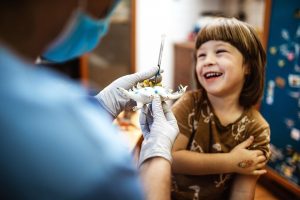Dokuczanie w szkole ‒ co wtedy robić?
Spis treści:
Dlaczego dzieci dokuczają sobie w szkole?
Rywalizacja między rówieśnikami to zjawisko naturalne, a nawet w pewnym stopniu konieczne, by inspirować do rozwoju lub uczyć relacji. Jest jednak jeden warunek: musi być zdrowa, oparta na wzajemnym szacunku i dialogu.
Zjawisko dokuczania występuje w szkołach bardzo często. Wiele dzieci funkcjonuje w relacjach przemocowych, a szkolny kozioł ofiarny bywa prześladowany nie tylko przez jednostki, ale i przez całe grupy rówieśnicze. Przyczyny dokuczania w szkole mogą być złożone i dotarcie do nich jest istotne, by dowiedzieć się, dlaczego do niego dochodzi, a także co zrobić, by mu zapobiegać.
‒ Teenagebullying, dosłownie przemoc nastolatków, inaczej tyranizowanie, znęcanie się, powtarzalne zachowania o charakterze agresywnym jednego lub grupy małoletnich sprawców wobec nastolatka, jest wyjątkowo niebezpiecznym zjawiskiem. Większość dzieci, młodzieży i osób dorosłych, z którymi pracuję, przeżyła takie sytuacje w przeszłości. Niektórzy uporali się z tym od razu, ale inni wracają myślami nawet po kilkunastu latach ‒ zwraca uwagę psycholog Agata Kotowska.
Statystycznie dokuczanie dotyczy ponad połowy uczniów. Wskaźnik ten stale rośnie i jest prawdopodobne, że statystyki nie ujmują wszystkich przypadków. W wielu sytuacjach źródłem depresji czy prób samobójczych u dzieci jest właśnie dokuczanie ze strony rówieśników.
Najczęstsze przyczyny dokuczania w szkole to m.in.:
- Przejmowanie niewłaściwych wzorców z domu rodzinnego, gdy rodzic jest agresywny, krytyczny wobec dziecka lub wobec innych osób.
- Przejmowanie złych wzorców z sieci, gdzie skala hejtu rośnie i jest on niemal bezkarny.
- Maskowanie własnych kompleksów czy słabości przez atak na słabszych.
- Fałszywe poczucie zjednoczenia grupy we wspólnym prześladowaniu ofiary.
- Brak autorytetów wśród dorosłych ‒ rodziców czy nauczycieli.
Jak rozwiązać ten problem? Do kogo się zwrócić?
Dzieci, które doświadczają dokuczania w szkole, bywają osobami wysoko wrażliwymi, nieśmiałymi, lękliwymi. Mogą mieć kompleksy z powodu cech, które grupa rówieśnicza postrzega jako gorsze: okularów, jąkania się, nadwagi. Często są osamotnione, a pogłębiają to prześladowania. Jeśli dziecko nie ma oparcia w rodzicu, który bagatelizuje lub wręcz przypisuje ofierze inicjowanie ataków („gdybyś nie był taką ofermą…”, „powinieneś sam znaleźć z nimi wspólny język”), sytuacja takiego ucznia staje się tragiczna.
Co zrobić, gdy doświadcza się dokuczania w szkole? Najważniejsze to:
- Znalezienie zaufanej dorosłej osoby – rodzica, pedagoga szkolnego, nauczyciela, któremu przedstawi się sytuację i który podejmie realne działania na rzecz poprawy sytuacji.
- Znalezienie grupy wsparcia, np. w ośrodku terapeutycznym lub online.
- Skorzystanie z profesjonalnej pomocy, np. z telefonu zaufania.
- Uczęszczanie na terapię, która umożliwi uporanie się z sytuacją.
- Znalezienie przyjaciół, wsparcia grupy rówieśniczej.
‒ W każdej sytuacji, kiedy widzimy, że trudne relacje z rówieśnikami wpłynęły na zmiany w funkcjonowaniu dziecka, że stało się wycofane lub agresywne w domu, odreagowując presję szkolną, trzeba zadbać o jego psychikę. Przeciążenia emocjonalne, poczucie osamotnienia i bezradności oraz sytuacje o charakterze traumatycznym mogą odcisnąć swoje piętno. Wówczas konieczne jest włączenie w pomoc dziecku psychologa lub/i psychoterapeuty – podpowiada psycholog Agata Kotowska.
Jak dodaje, mogą być konieczne: spotkania z psychoterapeutą, terapia w małej grupie, treningi, np. TUS, czyli trening umiejętności społecznych, lub TZA, trening zastępowania agresji. W najtrudniejszych przypadkach, kiedy krzywdzone przez rówieśników dziecko chce się targnąć na swoje życie, do działania trzeba włączyć lekarza psychiatrę.
Jak rozmawiać z dzieckiem, któremu ktoś dokucza?
W sytuacji, gdy dziecko doświadcza dokuczania, bardzo ważna jest rola wspierającego rodzica (lub innego dorosłego). Jak postąpić, gdy dowiemy się, że dziecko doświadcza dokuczania? Na pewno nie wolno pozostać obojętnym.
‒ Uczniowie, wobec których rówieśnicy stosują przemoc, często bywają przestraszeni, zawstydzeni i bezradni. Mają poczucie, że są ze swoimi kłopotami sami, i nie wiedzą, co mogą zrobić. Kiedy szukają pomocy, bywają stygmatyzowani i etykietowani, np. nazywani „kolaborantami”‒ zauważa Agata Kotowska.
Szkoła nie zawsze jest bezpiecznym miejscem, a nauczyciele, wychowawcy i pedagodzy nie zawsze są otwarci i przygotowani na odpowiednią reakcję. – Także rodzice czasem nie potrafią dostrzec problemu, wypierają go, mając własne zmartwienia. Kiedy podejrzewamy, że coś niepokojącego dzieje się w życiu dziecka, nie zostawiajmy córki czy syna samym sobie. Warto zacząć od spokojnej wspierającej rozmowy – tłumaczy ekspertka.
Dzieci doświadczające przemocy mogą czuć się zawstydzone i nie chcieć dzielić się swoimi problemami. Dlatego rozmowę należy poprowadzić delikatnie, z wyrozumiałością i taktem.
‒ Próbujmy zadawać otwarte pytania, pozwalające na swobodną wypowiedź, coś więcej niż „tak” lub „nie”. Zaprośmy dziecko do rozmowy w sprzyjającej, bezpiecznej atmosferze. Zwróćmy uwagę na miejsce i ewentualne osoby trzecie, które miałyby w niej uczestniczyć. Zamiast wyciągać na siłę, kto, kiedy, jak, gdzie itp., zapewnijmy, że jeśli nie teraz, to w niedalekiej przyszłości jesteśmy gotowi na powrót do rozmowy – podkreśla Agata Kotowska.
Warto zachęcać dziecko do zmiany myślenia o sobie i wzmacnianie w nim poczucia, że nikt nie ma prawa go krzywdzić. Często wystarczające jest jasne wyrażenie zdania o ochronie własnych granic. Skuteczne może być zwrócenie się o pomoc do kolegów (i wspólny sprzeciw wobec przemocy) lub nauczycieli.
Celem rozmowy z młodym człowiekiem, któremu dokuczają w szkole, jest zarówno potępienie sprawców, jak i wzmocnienie go.
‒ Dobrze byłoby, gdyby rodzicowi udało się przekonać dziecko do tego, że wcale nie musi być bezradne i że nawet w trudnych sytuacjach można znaleźć rozwiązanie. Poczucie mocy i sprawczości, że dziecko ma wpływ na sytuację i może bronić się na różne sposoby, często wyzwala dużą kreatywność i siłę psychiczną– mówi Agata Kotowska.
Kiedy dokuczanie dzieje się w szkole, warto upewnić się, czy placówka wie o problemie, i oczekiwać konkretnego rozwiązania. Szkoła powinna mieć wypracowane procedury w takich przypadkach, np. może zaproponować rozmowy pedagogów z dziećmi lub rozmowy w gronie rodziców, np. podczas specjalnego zebrania w grupie zainteresowanych. Warto, aby po zgłoszeniu problemu w terminie ustalonym wspólnie ze szkołą, np. po dwóch tygodniach lub miesiącu, dowiedzieć się, jakie konkretnie kroki zostały podjęte. Gdyby zdarzyło się, że dziecku pomoc w szkole nie została udzielona, warto rozważyć włączenie kolejnych organów (kuratorium), a nawet zmianę placówki.
Jak rozmawiać z dzieckiem, które dokucza?
Jeżeli ze szkoły lub od rodziców innych dzieci otrzymamy informacje, że dziecko dokucza innym, należy przeprowadzić poważną rozmowę. Konieczne jest stanowcze stanowisko w tej sprawie, że nie tolerujemy podobnych zachowań, że nie da się tłumaczyć ich wiekiem, charakterem, młodzieńczym buntem czy prowokacją ofiary.
‒ Zastanówmy się, dlaczego powstało takie zachowanie i co może oznaczać. Często zdarza się, że krzywdzą te dzieci, które same zostały skrzywdzone. Właściwie w każdej sytuacji, kiedy nasze dziecko krzywdzi kogoś, warto objąć je terapią wspierającą i uczącą innych sposobów wyrażania trudnych emocji (np. złości czy strachu). Może się też zajść konieczność terapii rodzinnej, w której my, rodzice, będziemy mieli szansę zmienić podejście do pewnych kwestii – podkreśla psycholog Agata Kotowska.













































